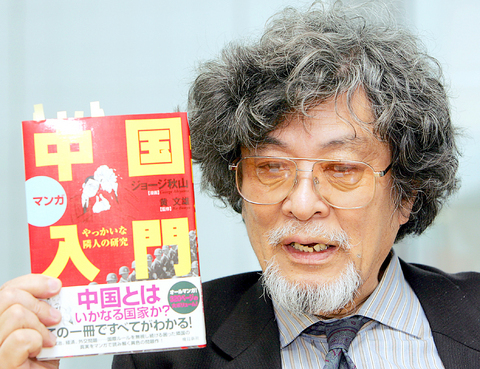In one book, crazed Chinese Communist guerrillas spray benevolent Japanese troops with cyanide. In another, savage Korean immigrants massacre innocent Tokyo residents in the wake of World War II.
If this sounds like a reversal of Japan's history of aggression in Asia, that is just what the authors intend. The scenes appear in two best-selling examples of a growing literary genre in Japan: nationalist comics.
The trend, typified by the runaway hits Hate Korea: A Comic and Introduction to China, has struck a chord among young readers who resent Japan being cast as the bully in 20th century history -- and say it is time for a change.

PHOTO: AP
"These books finally depict history from a Japanese perspective, and there is nothing wrong with that," says Atsushi Iwata, 22, a student at Tokyo's prestigious Waseda University who attends a weekly seminar by a co-author of Introduction to China.
"It's the right of any nation to interpret history as it feels it should," he said.
The interpretation in the recent comic books is nothing short of provocative -- at a time of rising tensions between Tokyo and its neighbors, and as Japan takes a decided tilt toward an unapologetic view of previous military action.
Hate Korea tells the tale of wide-eyed Japanese college freshmen who discover that Japan's colonial rule over the Korean peninsula from 1910-45 -- seen in Korea as brutal subjugation -- was a well-intentioned attempt to bring civilization to a backward country.
"It's not an exaggeration to say modern Korea was built by Japan," one of the Japanese students, eyes shining, declares toward the end of the book. Her Korean debate opponent, fuming at the mouth, is unable to respond.
The China tome covers similar territory, vehemently denying Japanese atrocities in China during its invasion in the 1930s and 1940s, such as biological experiments carried out by the Imperial Army's top-secret Unit 731.
Even more venom is reserved for modern Chinese. The book accuses Beijing of distorting history, running crime syndicates in Japan and flooding the country with "AIDS-infested prostitutes," and calls for stricter immigration controls against Chinese workers.
The formula sells: The Korea book has gone through five reprints and sold more than 320,000 copies since its release in September. The China book has sold 180,000 copies since its appearance in August.
The comics build on a genre established by comic artist Yoshinori Kobayashi in the 1990s.
His Manifesto of New Pride series of comics -- which claim Japan waged a noble war to liberate Asia from a racist world order -- have sold over a million copies.
Proponents expect the trend to expand. But many Japanese are disturbed by the trend.
Toshio Hanafusa, an activist who has campaigned for compensation for Korean women forced to work as wartime prostitutes for Japan's Imperial army, blames the insecurity and disillusionment of younger Japanese for the popularity of the books.
"Perhaps they seek pride in the idea of a more assertive Japan," he said. "And cleansing Japan's history of any sense of guilt bolsters that pride."

Kehinde Sanni spends his days smoothing out dents and repainting scratched bumpers in a modest autobody shop in Lagos. He has never left Nigeria, yet he speaks glowingly of Burkina Faso military leader Ibrahim Traore. “Nigeria needs someone like Ibrahim Traore of Burkina Faso. He is doing well for his country,” Sanni said. His admiration is shaped by a steady stream of viral videos, memes and social media posts — many misleading or outright false — portraying Traore as a fearless reformer who defied Western powers and reclaimed his country’s dignity. The Burkinabe strongman swept into power following a coup in September 2022

‘FRAGMENTING’: British politics have for a long time been dominated by the Labor Party and the Tories, but polls suggest that Reform now poses a significant challenge Hard-right upstarts Reform UK snatched a parliamentary seat from British Prime Minister Keir Starmer’s Labor Party yesterday in local elections that dealt a blow to the UK’s two establishment parties. Reform, led by anti-immigrant firebrand Nigel Farage, won the by-election in Runcorn and Helsby in northwest England by just six votes, as it picked up gains in other localities, including one mayoralty. The group’s strong showing continues momentum it built up at last year’s general election and appears to confirm a trend that the UK is entering an era of multi-party politics. “For the movement, for the party it’s a very, very big

ENTERTAINMENT: Rio officials have a history of organizing massive concerts on Copacabana Beach, with Madonna’s show drawing about 1.6 million fans last year Lady Gaga on Saturday night gave a free concert in front of 2 million fans who poured onto Copacabana Beach in Rio de Janeiro for the biggest show of her career. “Tonight, we’re making history... Thank you for making history with me,” Lady Gaga told a screaming crowd. The Mother Monster, as she is known, started the show at about 10:10pm local time with her 2011 song Bloody Mary. Cries of joy rose from the tightly packed fans who sang and danced shoulder-to-shoulder on the vast stretch of sand. Concert organizers said 2.1 million people attended the show. Lady Gaga

SUPPORT: The Australian prime minister promised to back Kyiv against Russia’s invasion, saying: ‘That’s my government’s position. It was yesterday. It still is’ Left-leaning Australian Prime Minister Anthony Albanese yesterday basked in his landslide election win, promising a “disciplined, orderly” government to confront cost-of-living pain and tariff turmoil. People clapped as the 62-year-old and his fiancee, Jodie Haydon, who visited his old inner Sydney haunt, Cafe Italia, surrounded by a crowd of jostling photographers and journalists. Albanese’s Labor Party is on course to win at least 83 seats in the 150-member parliament, partial results showed. Opposition leader Peter Dutton’s conservative Liberal-National coalition had just 38 seats, and other parties 12. Another 17 seats were still in doubt. “We will be a disciplined, orderly